- Home
- Taylor Caldwell
This Side of Innocence
This Side of Innocence Read online
This Side of Innocence
A Novel
Taylor Caldwell
To Freda and Felix Muehlner
A garden was the primitive prison, till man, with Promethean felicity and boldness, luckily sinned himself out of it. Thence followed Babylon, Nineveh, Venice, London, haberdashers, goldsmiths, taverns, playhouses, satires, epigrams, puns—these all came in on the town part, and the thither side of innocence.
—Charles Lamb
PART ONE
CHAPTER ONE
It seemed to Jerome Lindsey that disagreeable news invariably arrived when he and New York weather were in execrable moods.
Yesterday, the air had been beguilingly mild and balmy, for all it was the middle of December, and the sun had had a misty golden effusion about it. This had all fitted nicely into the background of his own buoyancy: a particularly desirable and delectable young lady had given every promise of succumbing to a long siege in the evening. Yesterday, then, Jerome had appeared much younger than he did today. He had actually felt sparkle and exuberance. But that was yesterday.
Today, he felt more than senile. It was a senility mixed with various sensations of anguish. He was almost prepared to admit that champagne did not agree with him. But that plebeian confession still hovered uneasily about in a head that gave ominous indication that somewhere, somehow, during the night, it had been stepped upon, hard, by a brace of draft horses. The lady, unfortunately, had not stepped upon him. She had been much more amenable even than he had hoped. He wished, now, that she had shown a little restraint.
The weather matched his mood and his sensations. Sleet obliterated the brown buildings opposite in skeins of gray and swirling wool. Wind shrieked at his windows. The pavements were aslush, and a few wayfarers scurried along under pallidly gleaming umbrellas.
Nor, as he lingered over pots of coffee, and coffee only, did his mail touch his life with a glimmer of brightness. There were a few dull invitations. But the mass was almost entirely composed of bills. He regarded them, unopened, with pain, screwed up his lined face, and threw them into his wastebasket. Jim, his man, would later salvage them and lay them in a neat, but unobtrusive pile, upon his desk. In the meantime, he did not care to look at them. Just as he did not care to look at his face, which would inevitably suggest that he was much older than his thirty-four years, and much more repellent than he actually was in less head-cracking moments.
He was still unshaved. He could never bear to shave after a particularly hectic night. It only increased his suspicions that his skull was ready to fall into brittle fragments. His eyes watered, felt hot and rough and sore. He blinked them, bending forward to examine the last letter or two by the light of a very pretty alabaster lamp which he had bought in Italy the summer before.
There was a letter from his sister, Dorothea. He scowled. He was about to toss the letter aside, to be read in a less painful hour, when he noticed that the envelop was thick and bulging. Dorothea was not in the habit of writing long letters. One thin tissue sheet was usually enough for her, and even that one sheet required considerable mental bracing on the part of Jerome. But his curiosity overcame his involuntary wincing at the idea of reading one of Dorothea’s letters, and he opened it. As he did so, he shouted to Jim to bring him more coffee. He began to read Dorothea’s letter:
“Hilltop,
Riversend, New York,
15th December, 1868
“My dear Jerome:
“In the same post with my letter you will doubtless receive Papa’s epistle with news that may seem to you merely amiable and pleasant, and of which you may possibly approve, in your careless way. I am afraid, however, that it will do little more than to stir your most casual interest, for you have never displayed that family solicitude and loyalty which are so important in dear Papa’s life. You will forgive me, I trust, for recalling to your memory your unremitting amusement at Papa’s sense of family and tradition, for it has always deeply wounded me. Even when you were only a schoolboy you appeared to find Papa’s sentiments little less than ridiculous, and my heart is still scarred at the remembrance of your remarks to him on the subject on your seventeenth birthday. As if tradition and family pride and honor were somehow reprehensible and jejune, and not to be countenanced by young gentlemen with worldly and sophisticated pretensions!
“I am afraid that my sensibilities are so disturbed by this memory, and the memory of others hardly less insensible, that I am diverging from my subject. But I wish to assure you that only my agitation and distress impel me to write this letter to you, for we have been somewhat less than friends, though brother and sister. Then, my conscience sometimes disturbs me with a sense of guilt. I am four years your senior, and it was to my care that our dear mama consigned you before she was called Home. Have I failed in my duty? Are there hidden reproaches you could address to me but do not do so out of fraternal delicacy? But no, I hardly believe this. Delicacy was never one of your more prominent traits of character. Surely, I pray Heaven, I am not guilty of your curious sense of humor, your reckless way of living, your extravagance and irresponsibility, your debts and your foolish aspirations for an artistic career. If I am guilty at all, it is because I have never understood you, and that my precepts of integrity, honor, and an edifying and genteel manner of living failed to make any impression upon you.
“I hope and pray in my heart that darling Mama will not greet me with sad reproaches when I join her in those quiet fields of peace after my earthly journey is completed. I have done my best, and I may say this in all humble sincerity.”
“Dear, dear Dorothea!” said Jerome, taking up another thin sheet of paper with its closely written lines in thin purple ink.
“It is to be understood” (Dorothea continued in writing that rapidly became more agitated) “that as you have taken so little interest in family affairs in the past years, because of your peregrinations through Europe, your long and indifferent sojourns in New York, Boston and Philadelphia, and your residence among worldly ladies and gentlemen without probity and a serious regard for the problems of the world, that the news that our cousin, Alfred, is about to marry again will do little more than to cause you to raise an eyebrow. I beg of you to give thought for just a moment to the implications of the matter.”
“Good God!” exclaimed Jerome, aloud, and laughing immoderately, “is that stick about to propose for old Dotty after all?” He bent closer to the lamp that was shining brighter now in the December dusk. He had been reading with that amused indifference to everyone but himself which his sister found so insufferable, but now his interest was awakened.
“It is my constant prayer” (Dorothea went on) “that I shall always remember that I am a Christian gentlewoman, that I must harbor in my breast only the most Christian sentiments of charity and forbearance, and as our dear, late lamented President has urged, ‘malice towards none.’ I am certain that not even my worst enemy can accuse me, with truth, of forgetting those axioms of pious conduct implanted in my youthful heart by darling Mama. So, I implore you not to dismiss what I must say in the belief that any anxieties on my part rise from uncharitable motives or prejudice.
“I possess none of those snobberies and pretensions which so afflict those who have no securities of genteel birth and traditions and antecedents. From the elevation of our mutual ancestry, I can afford to be tolerant and kind, but just, I pray.
“Doubtless it will inflict ennui upon you if I remark, as I have remarked to you so often before, that Papa’s sense of family and traditional pride are the supreme motivations of his life, and I revere him for them. I should be less than his daughter if I did not do so. It was his hope that he might be blessed by many sons and daughters who would live about him, and present to
him flourishing families to share with him his reverence for property and the continuity of his blood and the immortality of his elevated traditions. But God, in His inexplicable wisdom (which I must confess I do not comprehend) saw fit to deprive Papa of these blessings, and allowed dear Mama to present to Papa only two children, you and myself. I do not reproach Heaven, but I find it a little difficult to understand—
“When I began this letter, so onerous and so bitter, under the circumstances, I warned myself sternly that I must not reprove you, nor remind you of things best forgotten. But in order to clarify what I must say, I am compelled to recall to you that though you are now nearly thirty-four years of age you have not seen fit to marry some genteel young lady of our mutual acquaintance, and that you have repeatedly declared, in Papa’s hearing, that you will never wed and give to Papa those grandsons for which he yearns so silently and so patiently. If I have any reproach at all to address to Papa, it is that he was always so tolerant with you, and displayed for you an affection which is very bewildering to me. Never did he urge upon you that conduct for which any gentleman with sensibility and filial devotion would have needed no urging. He allowed you to dissipate the seventy-five thousand dollars which Grandma Holden left to you, indiscreetly, without a single suggestion or reproach, and in his tenderness was really convinced that you were gifted. Nevertheless, as the years passed, I saw his sadness and regret, though not a single word of this, I am certain, ever reached you from his pen. Rather, he sent you large cheques at intervals, doubtless at your imperative request. You will recall that I am Papa’s secretary and housekeeper, and these cheques, in due time, all passed through my hands.
“You once told me that as Papa had adopted his brother’s son, Alfred, that relieved you of any responsibilities towards Papa, and that he now had a son who would do his duty for the family. Your indifference to the implications of this appalled me, but I kept silent. Not that I do not cherish Alfred as dearly as a brother—”
“And slightly more so,” remarked Jerome, with an unpleasant grin.
“—and do not rejoice that he has filled Papa’s remaining years with pleasantness and comfort and peace. I am sure you will not deny this. But Alfred’s first marriage, to Martha Winchester, resulted in nothing but poor young Philip who has neither the strength nor the possibility in him to give Papa great-grandsons, in due course of time. When Martha died, upon Philip’s birth, it seemed that our hopes vanished forever with her.”
“Not your hopes,” said Jerome, with disagreeable derision. “Poor old Dotty.”
“We have cherished Philip, and I have been a mother to him,” Dorothea continued. “He has repaid both Papa and me with gentle affection, as if he understood that his deformity has been such a bitter disappointment to us.
“As time passed, and Philip grew older, we were resigned to our fate. Alfred displayed no anxiety to marry again, and we all settled down to tranquil existence.”
“Not you!” said Jerome, laughing nastily. “You were after him day and night, in the most refined way possible, of course!”
“And then,” wrote Dorothea, and now her writing was so agitated as to be scarcely legible, and blotted suspiciously here and there, “like a bolt from the blue, Alfred announced his intention to wed again.”
“Ah, ha!” exclaimed Jerome, turning up the lamp. “Now this is going to be very interesting indeed! So it is not old Dotty, after all, thank God!” His expression brightened with malice and something very like gloating cruelty.
“Naturally, Papa and I were astounded. But I pray you to understand that I was not disturbed. On the contrary. Riversend has its adequate supply of marriageable and acceptable females of the proper age, for, after all, Alfred is nearly thirty-nine. But though I named them all to Alfred, he only shook his head and smiled. At length, we became conscious that he was uneasy, and that he kept glancing at Papa with a look that implored forgiveness in advance and affectionate tolerance.
“As you know, Alfred is now Papa’s vice-president at the Bank. Then Alfred told us an incredible tale that froze my blood. It seems that a certain young female without antecedents, and an entire stranger, appealed to him a few months ago for financial assistance. This young female, who, it is hinted, possesses the most mediocre if not sinister past (it must be so, for she speaks rarely of her former life) comes from Thorntonville, that very miserable little farm village thirty miles away. She had been engaged to teach our local rural school, for which she was paid forty dollars a month. She claims to be but twenty-two years of age, but I am positive she is much older, for not only are her features hard and calculating, and the expression of her eyes exceedingly unpleasant, but she has a certain boldness of manner and speech which argues for more years than she admits. Also, her dress is not that acceptable in a teacher, and is of finer stuff and fashion than her salary could conceivably allow, though she declares that she makes all her garments herself, with patterns from Godey. I will concede this, in charitableness, but my heart speaks differently.”
“Oh, no doubt,” said Jerome.
“After the first stunning effects of the news had left me, I journeyed alone to Thorntonville to investigate this young female, whose name is Amalie Maxwell. To my horror, my first premonitions about her were justified. Her father had been a drunken tenant farmer, and his wife had cleaned and washed for local respectable families until she died some ten years ago. Mr. Maxwell was later arrested for drunkenness, and suspected of numerous thefts. Two of the latter charges were proved, and he was sent to State’s prison, where he died seven years ago, leaving Miss Maxwell (if her claimed age is correct) to support herself at the age of fifteen. It would be suspected that a young female of that age, conscious of her background, would have entered service and there, with meekness and industry, would have tried to live down her past and elevate herself in the esteem of her mistress. But this she did not do. She decided, she says, to be a teacher. She declares that from her earliest youth she was disturbed by the ‘illiteracy’ of the poor, and that she intended to alleviate this with her own labors. When I remarked to her that God, in His wisdom, designates to each man his proper station in life, and that it is impious impudence to attempt to overturn this all-wise Design, she laughed coarsely in my face.
“Coarseness, I may say now, is her dominant characteristic. She has no modesty, no gentility, no presence, no graces. She utters language that no female of delicacy and breeding would utter. She has the boldness of an uneducated man, and I have often heard her swear like a groom. Alfred, in his fatuousness, finds her amusing and refreshing, and he dotes on her like the elderly man he is, as though she were his daughter! But I have discerned at times that she embarrasses him. In his lack of a sense of proportion he actually pleaded with me to be a ‘mother to the girl,’ though I am but thirty-eight, myself, and certainly possess too much breeding to associate with one so bereft of all genteel traits!”
“Good old imbecile Alfred!” cried Jerome, with enjoyment.
“Alfred must feel some lack, Jerome, or he would not have made this insulting and preposterous request of me, and the further request to teach Miss Amalie the most rudimentary arts of proper social intercourse and behavior. I promised to accede to his request, and, crushing down my sense of grief and outrage, I invited the young woman to sojourn with us until her marriage to Alfred, which has been marked for Christmas week. She willingly enough abandoned her mission to elevate the children of the poor, which proves her innate hypocrisy and wiliness, and has now taken up residence in the rose suite.
“To prove to you her complete lack of understanding of all delicacy and propriety, she accepted nearly a thousand dollars from Alfred, and went to New York, in my company, to purchase for herself a most flamboyant and indiscreet wardrobe! This is her trousseau. Such bonnets, such daring gowns, such colors, not at all befitting the future wife of Alfred Lindsey! Such lack of taste and discretion! There is a certain red gown of which the less said the better—
“Jerome, I implo
re you to understand! You know Alfred, his sobriety, his integrity, his single-heartedness, his sense of duty and responsibility, his soundness of principle, his probity, his devotion to family tradition and to dear Papa, and his position at the Bank! And think, then, of this reprehensible female, without background, delicate education and decorum, the daughter of a drunkard and a washwoman, as our Alfred’s wife! I beg of you to believe that had this creature possessed the slightest humble knowledge of her overwhelming good fortune, had she appeared aware that her guardian angel had conferred upon her the most astounding fate, had she admitted that she was deeply fond of Alfred, and was preparing to make him a devoted and docile and grateful wife, I might have forgiven her, and attached myself to her as an older sister. But, incredible though this seems (and I hardly expect you to believe me under the circumstances), her attitude indicates that it is Alfred who has been singularly blessed, that it is Alfred who has been selected by Heaven for great good luck, and that while she is moderately attracted to him, it required months of the most sedulous courtship and pleading on his part to induce her to consent to be his wife! I know that you will laugh incredulously and with anger at this, and despise this creature for her lies and shamelessness. When I, concealing my pain and disbelief, indulgently asked her why she had finally consented, she laughed and said: ‘My room is so cold in the winter, and I’m getting tired of meat once a week!’
“She is coarse, full of impertinence and effrontery and arrogance. I cannot impress this too deeply upon you. Think, Jerome, of the significance of all this. She will be Alfred’s wife, the mother of his children, who will then inherit the Bank. You have long assured Papa that you wanted no active part in the Bank, that nothing would induce you to live in Riversend. But I beg of you to think of this woman, and her heirs, as inheritors of the Bank founded so long ago by Great-grandpapa, who was second cousin to Lord Brandon, in England. Can you contemplate such an interloper in our life, such an abandoned creature? Does it not stir your careless blood to conceive of her children as the recipients of the wealth and prestige of our family? What shall we, the true descendants of Great-grandpapa, inherit? We shall be defrauded and thrown out by the children of a woman whom charity forbids me to describe too fully.”

 Testimony of Two Men
Testimony of Two Men Wicked Angel
Wicked Angel The Arm and the Darkness
The Arm and the Darkness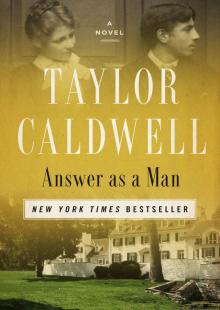 Answer as a Man
Answer as a Man Grandmother and the Priests
Grandmother and the Priests On Growing Up Tough: An Irreverent Memoir
On Growing Up Tough: An Irreverent Memoir Ceremony of the Innocent
Ceremony of the Innocent The Listener
The Listener Bright Flows the River
Bright Flows the River The Earth Is the Lord's
The Earth Is the Lord's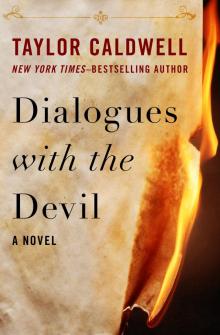 Dialogues With the Devil
Dialogues With the Devil A Tender Victory
A Tender Victory This Side of Innocence
This Side of Innocence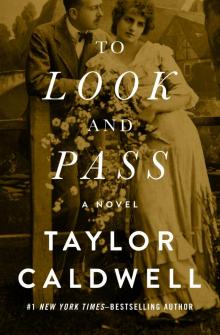 To Look and Pass
To Look and Pass The Strong City
The Strong City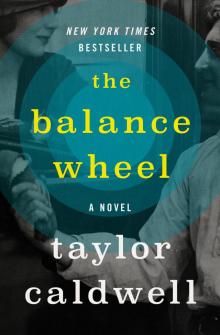 Balance Wheel
Balance Wheel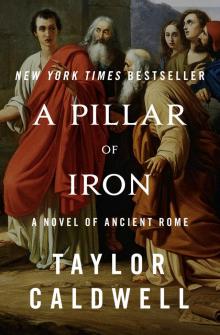 A Pillar of Iron: A Novel of Ancient Rome
A Pillar of Iron: A Novel of Ancient Rome Glory and the Lightning
Glory and the Lightning Dear and Glorious Physician
Dear and Glorious Physician The Wide House
The Wide House The Final Hour
The Final Hour Never Victorious, Never Defeated
Never Victorious, Never Defeated Unto All Men
Unto All Men The Turnbulls
The Turnbulls Your Sins and Mine: The Terrifying Fable of a World Without Faith
Your Sins and Mine: The Terrifying Fable of a World Without Faith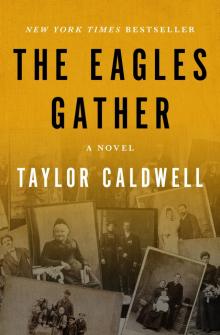 The Eagles Gather
The Eagles Gather Let Love Come Last
Let Love Come Last The Devil's Advocate: The Epic Novel of One Man's Fight to Save America From Tyranny
The Devil's Advocate: The Epic Novel of One Man's Fight to Save America From Tyranny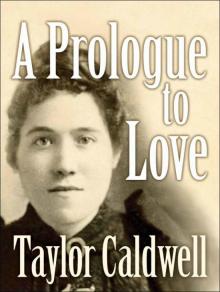 A Prologue to Love
A Prologue to Love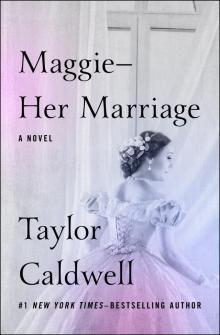 Maggie: Her Marriage
Maggie: Her Marriage The Late Clara Beame
The Late Clara Beame Melissa
Melissa Great Lion of God
Great Lion of God Captains and the Kings
Captains and the Kings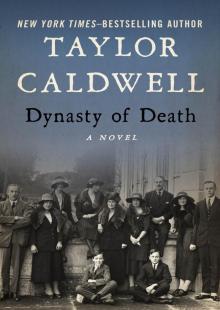 Dynasty of Death
Dynasty of Death No One Hears but Him
No One Hears but Him The Sound of Thunder
The Sound of Thunder There Was a Time
There Was a Time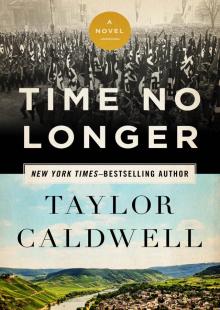 Time No Longer
Time No Longer I, Judas
I, Judas The Devil's Advocate
The Devil's Advocate The Romance of Atlantis
The Romance of Atlantis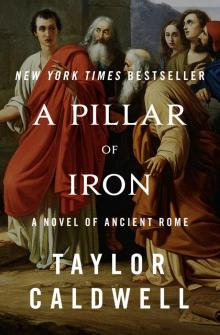 A Pillar of Iron
A Pillar of Iron On Growing Up Tough
On Growing Up Tough Your Sins and Mine
Your Sins and Mine